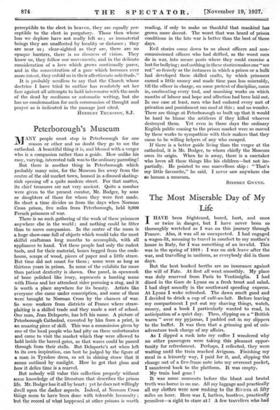Peterborough's Museum
MANY people must stop in Peterborough for one reason or other and no doubt they go to see the cathedral. A beautiful thing it is, and blessed with a verger who is a companion rather than a guide. How unlike his easy, varying, interested talk was to the ordinary parroting!
But there is another thing in Peterborough which probably many miss, for the Museum lies away from the centre of the old market town, housed in a disused skating- rink opening off a quite modern street. For that matter, its chief treasures are not very ancient. Quite a number were given to the present curator, Mr. Bodger, by sons or daughters of those for whom they were first made. So short a time divides us from the days when Norman Cross prison, five miles from Peterborough, held 9,000 French prisoners of war.
There is no such gathering of the work of these prisoners anywhere else in the world ; and nothing could be fitter than to move compassion. In the centre of the room is a huge show-case full of objects which would take the most skilful craftsman long months to accomplish, with all appliances to hand. Yet these people had only the rudest tools, and for their material, bones begged from the cook- house, scraps of wood, pieces of paper and a little straw. But time did not count for them ; some were as long as thirteen years in prison. In some of the exhibits far more than patient dexterity is shown. One panel, in openwork of bone polished like ivory, represents a hunting scene with Diana and her attendant rider pursuing a stag, and it is worth a place anywhere for its beauty. Artists like everyone else came under conscription, and some of them were brought to Norman Cross by the chances of war. So were workers from districts of France where straw- plaiting is a skilled trade and they made a sort of school. One man, Jean Delaporte, has left his name. A picture of Peterborough Cathedral, executed by him from a print, is lin amazing piece of skill. This was a commission given by one of the local people who had pity on these unfortunates and came to visit' the market which they were allowed to hold inside the barred gates, so that wares could be passed through from their stalls. But Delaporte's art when left to its own inspiration, can best be judged by the figure of a man in Tyrolese dress, so set in shining straw that it Seems outlined by sunlight. How he got that gloss and how it defies time is a marvel.
But nobody will value this collection properly without some knowledge of the literature that describes the prison life. Mr. Bodger has it all by heart; yet he does not willingly dwell upon the darker aspects. Indeed, at Norman Cross things seem to have heen done with tolerable humanity ; but the record of what hapixned at other prisons is worth reading, if only to make us thankful that mankind has grown more decent. The worst that was heard of prison conditions in the late war is better than the best of those days.
Evil stories come down to us about officers and non-: commissioned officers who had drifted, as the worst men do in war, into secure posts where they could exercise a' lust for bullying ; and nothing in these stories makes one " see red " so fiercely as the instances in which a prison or a hulk ' had developed these skilled crafts, by which. prisoners earned a little money and made time pass less miserably, till the officer in charge, on some pretext of discipline, came in, confiscating every tool, and smashing works on which months of labour and hope and affection had been laid out. In one case at least, men who had endured every sort of privation and punishment ran mad at this ; and no wonder. There are things at Peterborough so built up that it would be hard to blame the artificers if they killed whoever destroyed them. Yet even in those days the ordinary English public coming to the prison market were so moved by these works to sympathize with their makers that they came to be willing helpers of any who escaped.
If there is a better guide living than the verger at the cathedral, it is Mr. Bodger, to whom chiefly the Museum owes its origin. When he is away, there is a caretaker who loves all these things like his children—but not im. partially. He pointed to one marvellous ship : " That's my little favourite," he said. I never saw anywhere else so human a museum.
STEPHEN GWYNN.














































 Previous page
Previous page